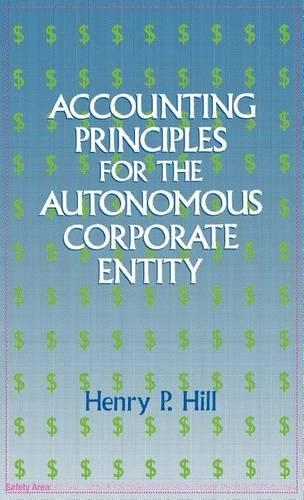
Accounting Principles for the Autonomous Corporate Entity
(Hardback)
Publishing Details
Accounting Principles for the Autonomous Corporate Entity
By (Author) Henry P. Hill
Bloomsbury Publishing PLC
Praeger Publishers Inc
15th April 1987
United States
Classifications
Tertiary Education
Non Fiction
657.950973
Physical Properties
Hardback
156
Reviews
About 30 or 40 years ago there were frequent debates in the accounting literature about the merits of a proprietary' versus an entity' theory. Hill proposes that many accounting controversies ought to be resolved by adopting a new entity approach for large corporations. This would result in treating interest payments as distributions of income (to capital providers) just as dividends are currently so treated. Hill, a former partner with the CPA firm Price Waterhouse, discusses a number of accounting issues, including business combinations, pensions, and leases.... This work could be useful to students writing papers on accounting controversies.-Choice
As Henry P. Hill proposes in his brief, brilliant new tract, Accounting Principles for the Autonomous Corporate Entity, ' the economists and common sense have capital placed more intelligently than the accountants do. Capital really is the assets on the left-hand side of the balance sheet, and what Generally Accepted Accounting Principles calls capital' is really the sources of capital.-American Banker
"As Henry P. Hill proposes in his brief, brilliant new tract, Accounting Principles for the Autonomous Corporate Entity, ' the economists and common sense have capital placed more intelligently than the accountants do. Capital really is the assets on the left-hand side of the balance sheet, and what Generally Accepted Accounting Principles calls capital' is really the sources of capital."-American Banker
"About 30 or 40 years ago there were frequent debates in the accounting literature about the merits of a proprietary' versus an entity' theory. Hill proposes that many accounting controversies ought to be resolved by adopting a new entity approach for large corporations. This would result in treating interest payments as distributions of income (to capital providers) just as dividends are currently so treated. Hill, a former partner with the CPA firm Price Waterhouse, discusses a number of accounting issues, including business combinations, pensions, and leases.... This work could be useful to students writing papers on accounting controversies."-Choice
Author Bio
HENRY P. HILL was National Director of Accounting and Auditing Services for Price Waterhouse.
